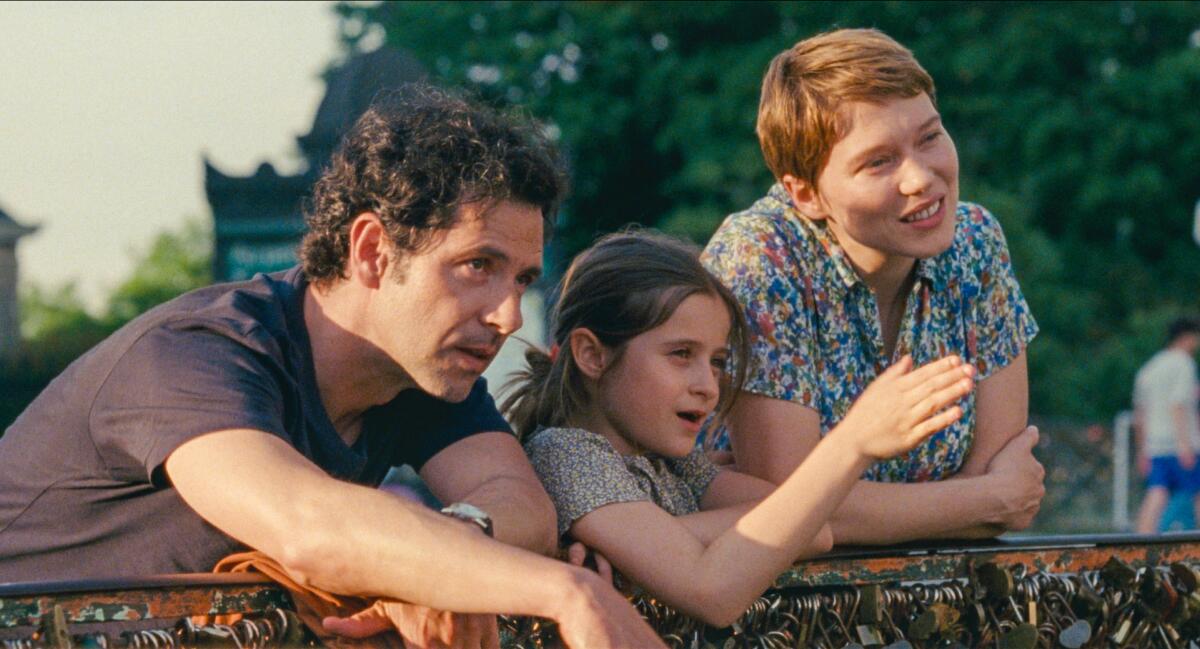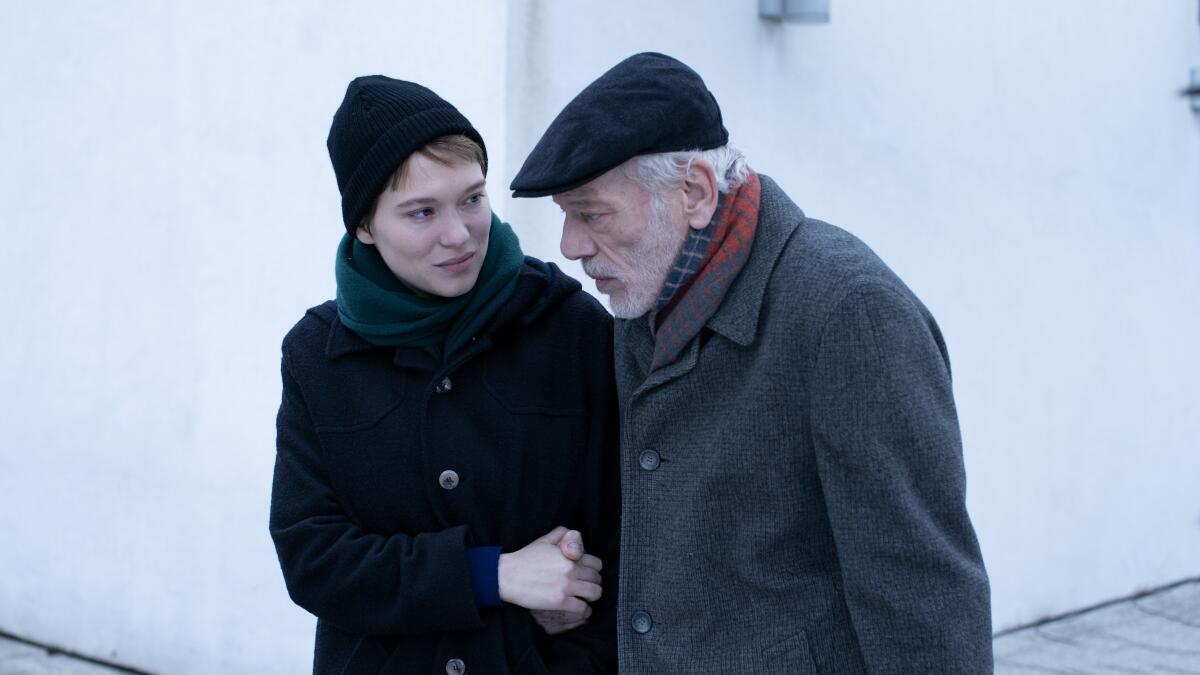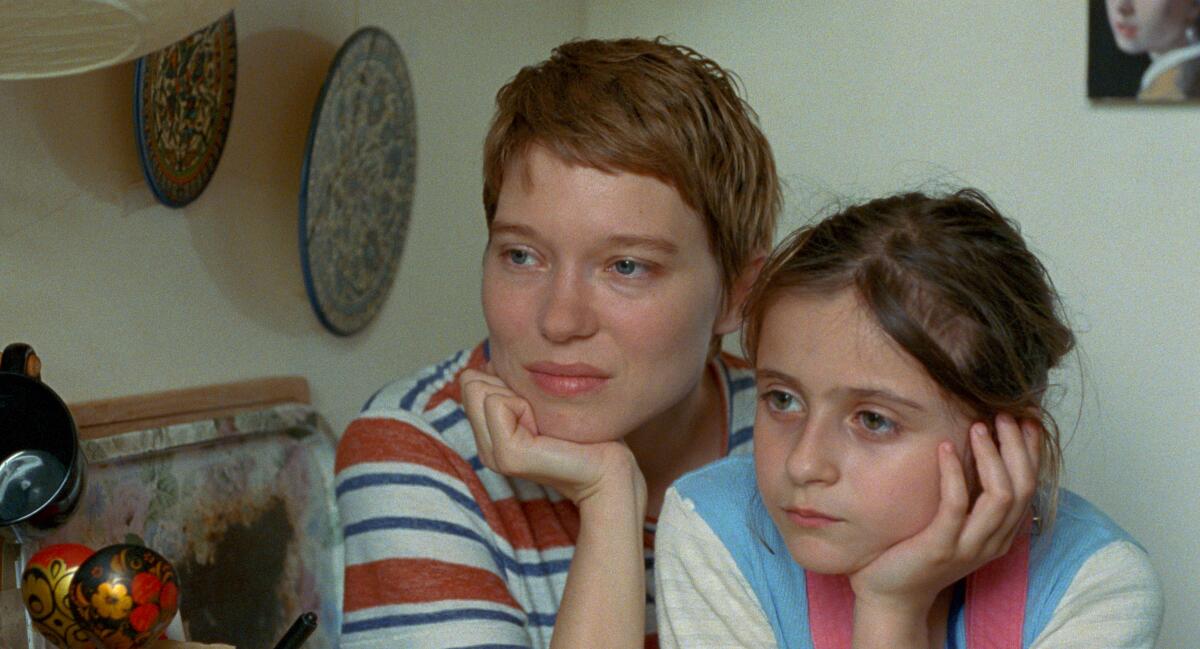To miss Léa Seydoux in ‘One Fine Morning’ is to miss one of the year’s best performances

- Share via
Near the beginning and the end of “One Fine Morning,” Mia Hansen-Løve’s lucid, affecting and radiantly intelligent new movie, Sandra (Léa Seydoux) drops by to see her father, Georg (Pascal Greggory). The months separating these two visits — though there have been many other visits in between — have aged them both, Georg more visibly. Already disoriented by his small Paris apartment in the early scenes, due to a neurological illness that is fast claiming his sight and his memory, he is, by the end, ever less certain of his surroundings or even the identities of his visitors. You see the passage of time in his distant gaze and slow-shuffling gait, and you also see it when Sandra, normally a steady, calming presence, steps aside and begins to cry.
Rest assured that I’ve given away nothing, and that I doubt there’s a more spoiler-proof movie — or a more graceful, moving one — arriving in theaters this week. As with a lot of films set to the pulse of ordinary life, you get the sense that this one could have ended a few beats sooner or, preferably, later. Hansen-Løve, who wrote as well as directed, doesn’t measure her stories in terms of conventional narrative progress. She knows that real-life drama is often incremental, and that it takes shape through repetitions, variations, complications both major and minor. What happens to her characters — a visit, a meltdown, a setback, a breakthrough — is seldom happening to them for the first or last time.
For your safety
The Times is committed to reviewing theatrical film releases during the COVID-19 pandemic. Because moviegoing carries risks during this time, we remind readers to follow health and safety guidelines as outlined by the CDC and local health officials.
And so for much of “One Fine Morning,” we are following Sandra, a widowed mother and freelance interpreter, through a familiar routine: checking in on her father, translating speeches and conversations for work, and picking up her young daughter, Linn (Camille Leban Martins), from school. Even when Sandra has a fateful run-in with Clément (Melvil Poupaud), an old friend who’s unhappily married with a kid of his own, their immediate spark and easy conversational flow suggest the latest piece in a mosaic they’ve been building for a while.
Before long and with a bracing lack of fanfare, Sandra and Clément are having an affair, one that courses with passion but, like everything else, has to be folded and sometimes forced into the parameters of everyday life. To make love or not make love, to stay together or spend time apart: No decision or development, big or small, exists in a vacuum. Here and in her earlier, equally well-observed dramas (“Eden,” “Things to Come”), Hansen-Løve has an intuitive sense of life’s fragmentation — something she hints at by sometimes opening and cutting off scenes mid-conversation or mid-gesture. (The relaxed editing is by Marion Monnier, the luminous cinematography by Denis Lenoir.)

She also has, in Seydoux, a collaborator whose impossible glamour and outsized dramatic gifts — she’s played a stormy lover in “Blue Is the Warmest Color,” a popular TV journalist in “France” and an unusually resonant and enigmatic Bond girl — have sometimes obscured her capacity for work this stealthily modest, this fine-grained and fully felt. Walking down the street in a sweater and a short-cropped Jean Seberg haircut, Seydoux dissolves into Sandra’s world beautifully. What holds you, as much as the actor’s natural magnetism, is her ability to hold things back, her talent for emotional reserve. Like a lot of people in real life, Sandra is in no hurry to announce who she is, partly because she’s still figuring that out.
And “One Fine Morning,” with its gently staccato rhythms and slyly unpredictable structure, is in no hurry to clue us in, either. You could call this a movie about a woman learning to say goodbye to her father while embracing the possibility of new love, and you’d be right, though at the risk of making it sound more diagrammatic than it plays. You might just as well call it a movie about the pleasures of strolling around Montmartre, sharing an ice cream cone or hiding Christmas presents under the tree. Or the difficulties of navigating France’s elder-care system, something that Sandra must undertake with her sister and her mother, Françoise (the actor and filmmaker Nicole Garcia), who divorced Georg years ago but remains, at least now, very much a part of his life.
Expository flashbacks would be antithetical to Hansen-Løve’s objectives, but here, with wordless economy, she pries open a window into past stories, past experiences. You wonder about Françoise and Georg’s earlier life together, especially their shared intellectual life, something the movie hints at with their matching wall-to-wall bookshelves. A bookshelf is never just a bookshelf in a Mia Hansen-Løve movie; it’s a collection of memories, an assertion of identity and an index of a life well lived. In one of the movie’s most softly piercing moments, Sandra muses, “I feel closer to my father with his books than with him” — a line that conjoins her memory of who he was and her grief over that memory starting to slip away.

Like Isabelle Huppert’s protagonist in “Things to Come,” Georg — played with aching sensitivity by Greggory — is a teacher of philosophy, and “One Fine Morning” itself feels effortlessly, casually philosophical. Unencumbered by obvious symbolism or windy speeches, even when the characters tend toward their own moments of introspection, it speaks quietly and assuredly to how we live and treat each other, how we care for the young and old and everyone in between, ourselves included. The answers it comes up with are never fixed, and it’s here that Hansen-Løve’s use of repetition proves especially revealing — not just a reminder of life’s stasis, but a measure of one’s ability to move forward.
At one point, while touring a nursing home for Georg, Sandra is confronted with what will become a familiar occurrence: an elderly resident stumbling into the wrong room unawares. The first time it happens comes as a mild shock to Sandra and her family, who’ve taken care of each other without knowing what it means to be a caretaker. By the third or fourth time, they’ve learned to step in, take this unexpected visitor by the arm and help them find their way. It’s a simple, fleeting gesture, one almost skipped over by the camera and unlikely to be noticed by the workers who perform the same gesture daily. But in this beautifully bittersweet and generous movie — which, like life itself, draws no distinction between the significant and the insignificant — it somehow also means the world.
‘One Fine Morning’
In French with English subtitles
Rated: R, for some sexuality, nudity and language
Playing: Laemmle Royal, West Los Angeles
More to Read
Only good movies
Get the Indie Focus newsletter, Mark Olsen's weekly guide to the world of cinema.
You may occasionally receive promotional content from the Los Angeles Times.










